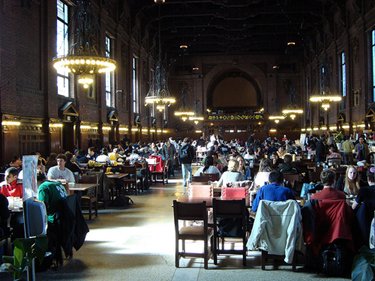
Yale’s University Commons, the freshman dining hall
William Deresiewicz criticizes American elite education from what might almost be a conservative perspective, but in the end he thinks the answer has to be a Utopia in which “you don’t have to go to the Ivy League, or any private college, to get a first-rate education.” Good luck with that, Bill.
If there is one idea, above all, through which the concept of social responsibility is communicated at the most prestigious schools, it is “leadership.†“Harvard is for leaders,†goes the Cambridge cliché. To be a high-achieving student is to constantly be urged to think of yourself as a future leader of society. But what these institutions mean by leadership is nothing more than getting to the top. Making partner at a major law firm or becoming a chief executive, climbing the greasy pole of whatever hierarchy you decide to attach yourself to. I don’t think it occurs to the people in charge of elite colleges that the concept of leadership ought to have a higher meaning, or, really, any meaning.
The irony is that elite students are told that they can be whatever they want, but most of them end up choosing to be one of a few very similar things. As of 2010, about a third of graduates went into financing or consulting at a number of top schools, including Harvard, Princeton, and Cornell. Whole fields have disappeared from view: the clergy, the military, electoral politics, even academia itself, for the most part, including basic science. It’s considered glamorous to drop out of a selective college if you want to become the next Mark Zuckerberg, but ludicrous to stay in to become a social worker. “What Wall Street figured out,†as Ezra Klein has put it, “is that colleges are producing a large number of very smart, completely confused graduates. Kids who have ample mental horsepower, an incredible work ethic and no idea what to do next.†…
Let’s not kid ourselves: The college admissions game is not primarily about the lower and middle classes seeking to rise, or even about the upper-middle class attempting to maintain its position. It is about determining the exact hierarchy of status within the upper-middle class itself. In the affluent suburbs and well-heeled urban enclaves where this game is principally played, it is not about whether you go to an elite school. It’s about which one you go to. It is Penn versus Tufts, not Penn versus Penn State. It doesn’t matter that a bright young person can go to Ohio State, become a doctor, settle in Dayton, and make a very good living. Such an outcome is simply too horrible to contemplate.
Deresiewicz is right and he is also wrong.
Elite culture in America always worshipped money and success. What is different today is that elite culture no longer respects its past or feels any meaningful connection to the rest of the country or the rest of society, except for recognized victims groups, patronage of which is useful for credentialing of the elite.
He’s right that race-based affirmative action is silly, and efforts at egalitarianism ought to be based on family finances and geographic representation. But, he fails to recognize that the education of national elites is not, in the end, about leveling. It is about building a leadership class, and our problem today is that American society has lost touch with its own identity and has replaced everything including conservation and transmssion of culture and paideia itself with left-wing power games based upon ressentiment.





Funktacular
Excellent observations!
Please Leave a Comment!